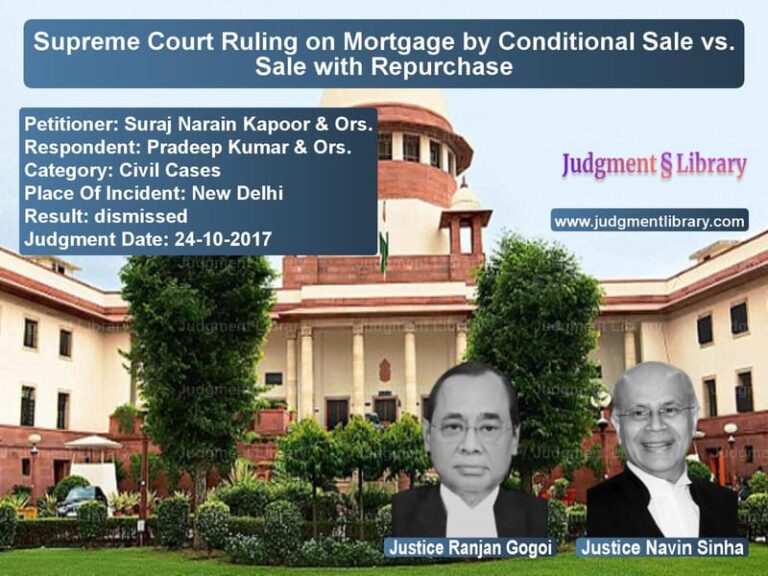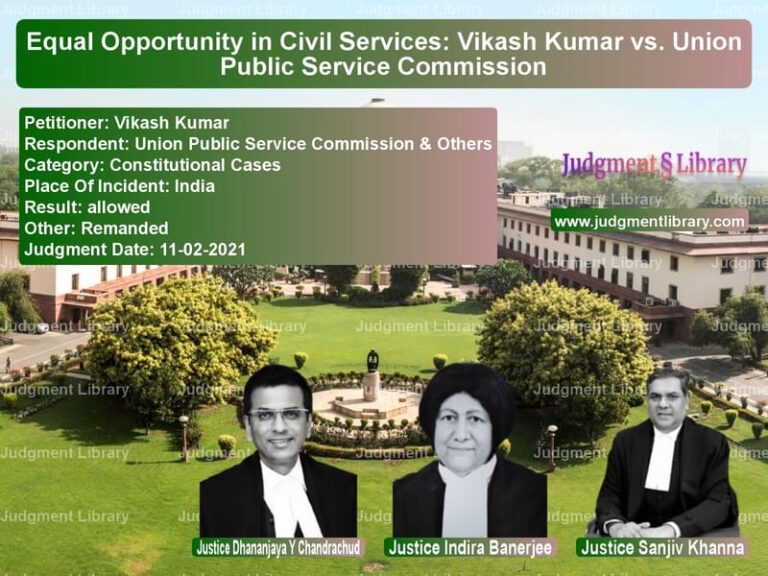Motor Accident Compensation: Supreme Court Enhances Relief for Disabled Victim
The case of Jagdish v. Mohan & Ors. is a landmark judgment concerning compensation for victims of motor accidents. The Supreme Court of India significantly enhanced the compensation awarded to the appellant, Jagdish, who suffered 90% permanent disability due to the accident. The Court ruled that compensation must reflect the true impact of disability on the victim’s livelihood, ensuring dignity and financial security.
Background of the Case
The appellant, Jagdish, was a 24-year-old carpenter when he met with an accident on November 24, 2011. The accident occurred at 4:00 PM when Jagdish and another person were riding a motorcycle. As he attempted to pass a dumper truck, the vehicle suddenly swerved, hitting his motorcycle and causing severe injuries.
Due to the injuries, the appellant suffered 90% permanent disability, losing the use of both hands. He became fully dependent on an attendant for basic daily activities, including eating and using the toilet.
Compensation Awarded by the Tribunal
The Motor Accidents Claims Tribunal, Kota, awarded Jagdish a compensation of Rs. 12,81,228. The breakdown of the compensation was as follows:
- Loss of future income: Rs. 7,87,320
- Mental and physical hardship: Rs. 1,80,000
- Loss of comfort: Rs. 90,000
- Medical expenses: Rs. 95,908
- Attendant charges: Rs. 1,00,000
- Other expenses: Rs. 25,000
However, the Tribunal did not award any amount for future medical expenses. The interest rate on the awarded amount was set at 7.5% per annum from the date of the claim petition.
Appeal to the High Court
The appellant appealed to the Rajasthan High Court, seeking an enhancement of compensation. The High Court increased the compensation by an additional Rs. 2,19,000, but the appellant remained dissatisfied, arguing that the amount awarded did not adequately reflect his loss of livelihood and future prospects.
Arguments by the Petitioner
The appellant, Jagdish, argued that:
- The Tribunal did not consider the full impact of his disability, as he had lost the functionality of both hands.
- The loss of earning capacity should have been calculated at 100%, rather than 90%.
- The monthly income of Rs. 4,050, as assumed by the Tribunal, was incorrect. His actual income as a carpenter was at least Rs. 6,000 per month.
- He was entitled to compensation for future medical expenses, which had been ignored by the Tribunal.
- As per the recent judgment in National Insurance Co. Ltd. v. Pranay Sethi, self-employed persons were entitled to 40% addition for loss of future prospects.
Arguments by the Respondents
The respondents, including the insurer and vehicle owner, contended that:
- The Tribunal had correctly calculated the compensation.
- The disability was assessed at 90%, not 100%, and should not be exaggerated.
- There was no documentary proof of the appellant’s claim of Rs. 6,000 per month income.
- The additional amount awarded by the High Court was sufficient and did not require further enhancement.
Supreme Court’s Observations
The Supreme Court rejected the contentions of the respondents and made the following key observations:
1. Compensation Should Reflect True Loss
The Court ruled that compensation should reflect not just physical disability but also the economic impact of the disability:
“For a person engaged in manual activities, the loss of hands is a complete deprivation of the ability to earn. The measure of compensation must reflect a genuine attempt of the law to restore the dignity of the being.”
2. Loss of Future Prospects for Self-Employed Persons
The Court applied the precedent set in Pranay Sethi, ruling that self-employed individuals were entitled to 40% additional compensation for loss of future prospects:
“The appellant is entitled to an enhancement of Rs. 2,400 per month towards loss of future prospects.”
3. Income Assumption Was Too Low
The Court revised the monthly income assumption from Rs. 4,050 to Rs. 6,000, stating:
“This claim cannot be regarded as being unreasonable or contrary to a realistic assessment of the situation.”
4. Disability Should Be Treated as 100%
Considering the appellant’s condition, the Court ruled that the loss of earning capacity must be 100% and not 90%:
“The Tribunal has noted that the appellant is unable to even eat or to attend to a visit to the toilet without the assistance of an attendant. In this background, it would be a denial of justice to compute the disability at 90 per cent.”
5. Future Medical Expenses Should Be Awarded
The Court found that the Tribunal erred in not awarding any amount for future medical care. It ruled:
“The appellant should be allowed an amount of Rs. 3 lakhs towards future medical expenses.”
Final Compensation Awarded by the Supreme Court
The Supreme Court awarded a total sum of Rs. 25,38,308, broken down as follows:
- Loss of future income (including future prospects): Rs. 18,14,400
- Pain, suffering, and loss of amenities: Rs. 2,00,000
- Medical expenses: Rs. 98,908
- Extra nourishment: Rs. 25,000
- Attendant expenses: Rs. 1,00,000
- Future medical expenses: Rs. 3,00,000
The interest rate on compensation was increased to 9% per annum, and the insurer, vehicle owner, and driver were held jointly liable.
Key Takeaways
- The Supreme Court recognized that disability compensation must reflect total loss of earning capacity.
- Self-employed accident victims are entitled to future prospects enhancement.
- Income assumptions must be realistic and based on the victim’s actual occupation.
- Courts must ensure that future medical expenses are adequately compensated.
- The judgment ensures a dignified compensation for accident victims suffering from total disability.
Conclusion
This judgment reinforces the principle that compensation in motor accident cases must be fair, adequate, and reflective of real economic losses. The Supreme Court’s decision provides clarity on assessing disability claims and ensures accident victims receive just compensation. By increasing the awarded amount, the Court has set a precedent for ensuring justice for victims who suffer life-altering injuries.
Petitioner Name: JagdishRespondent Name: Mohan & Ors.Judgment By: Justice Dipak Misra, Justice A.M. Khanwilkar, Justice Dr. D.Y. ChandrachudPlace Of Incident: Kota, RajasthanJudgment Date: 06-03-2018
Don’t miss out on the full details! Download the complete judgment in PDF format below and gain valuable insights instantly!
Download Judgment: Jagdish vs Mohan & Ors. Supreme Court of India Judgment Dated 06-03-2018.pdf
Direct Downlaod Judgment: Direct downlaod this Judgment
See all petitions in Road Accident Cases
See all petitions in Compensation Disputes
See all petitions in Negligence Claims
See all petitions in Judgment by Dipak Misra
See all petitions in Judgment by A M Khanwilkar
See all petitions in Judgment by Dhananjaya Y Chandrachud
See all petitions in allowed
See all petitions in Modified
See all petitions in supreme court of India judgments March 2018
See all petitions in 2018 judgments
See all posts in Accident Cases Category
See all allowed petitions in Accident Cases Category
See all Dismissed petitions in Accident Cases Category
See all partially allowed petitions in Accident Cases Category







